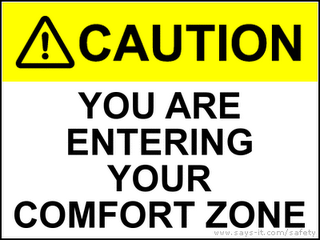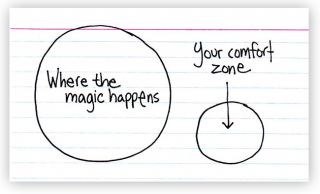Spirituality
From Comfort Zone to Courage Zone
How to take that leap of faith
Posted August 22, 2012

Let’s be honest. We say we want to move forward, but often we don’t do it. Some force inside holds us back. If we let our actions speak for themselves, they tell us that we much prefer to stay in our comfort zone rather than press forward into the courage zone. Why is that? Because, to the unconscious mind, sameness equals safety and change equals danger.
It is the main task of psychotherapists to help us question this core belief. Is your comfort zone really that comfortable? Is it really that safe? Comfort zones come in all shapes and sizes. And when it comes right down to it, many of them are far from comfortable.
Here are a few examples of comfort zones that a therapist might encounter in any given week: a 25-year-old who says she wants to move out of her parents’ home but doesn’t go apartment shopping; a man who says he wants to end an extramarital affair but keeps contacting his mistress; a man who says he wants to stop smoking but keeps sneaking cigarettes in the middle of the night; a woman who wants to lose weight but keeps eating ice cream and candy; a woman who says she wants to receive feedback about her problematic behavior but is defensive and dismissive when she receives it; a man who says he wants to slow down the pace of his life but decides to sign up to teach an extra class even while he’s working 60 hours a week already, has three young children, his wife is a working mom, and he’s got migraine headaches.
Can you see yourself in any of these examples? I know I can see myself in them. They are so common, so human. We know what we need to do to improve our lives. We say we want to change for the better and, at some level, we really believe it. But we are held back by this core belief—this flawed belief—that it is better to stay the way we are, even if it is painful, destructive, and in opposition to our own health and well-being.

In a good psychotherapy experience, this core belief is challenged. Not only do we come to see that the comfort zone isn’t really that comfortable, but we come to consider that the courage zone may not be all that dangerous. This internal shift requires both thinking and experience. We must test our underlying beliefs to see if they are really true or not.
The change process doesn’t happen in one step, but in many small steps. You do something different in the right direction. The behaviorists call it successive approximations. You wait a little longer between cigarettes. You don’t call the toxic girlfriend or boyfriend right away. You bite your tongue, just this time, instead of lashing back in anger. You say no to this enticing opportunity, just to give yourself a little more space and see what that is like.
One step leads to another. With each step, you challenge the underlying belief that change is dangerous. When you move into your courage zone by trying something new and you don’t, well, die, it’s kind of reinforcing. It’s reassuring. It’s encouraging. It might even help you get in your courage zone again next time. And the next and the next.
Copyright 2012 Jennifer Kunst, Ph.D.
Like it! Tweet it! Comment on it!
Follow me on Twitter@ CouchWisdom
To see more of Jennifer’s approach to psychotherapy, check out her newly released book: Wisdom from the Couch: Knowing and Growing Yourself from the Inside Out.


